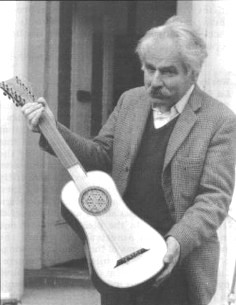
John Roberts
AN ENGLISH CUBISTColin Cooper:John Roberts – A Poet and His Music |
|
John Roberts was a player of the guitar and its ancestor the vihuela, a guitar historian,
a teacher (though with remarkably few pupils), an essayist, a diarist, but above
all a poet. His literary output was substantial, and included not only the Collected Poems,
the 651-page Guitar Travels
and the nine or ten 'slim' volumes of verse – most of which are quatrains, a favourite form – but also five parts of an extended Essay on the Guitar, published separately but
designed as chapters in a book. The book was never completed, but the chapters – 'Fingering', 'The Snag and the Exercise', 'Joints and Movements', 'Damping and Notes
on Study', 'The Left Hand' – are treasured by those few who obtained copies in the 1960s and 1970s. |  John Roberts |
He was an immensely keen and determined student of Emilio Pujol's in the annual summer course at Lérida. Although he never managed to acquire sufficient technique to become a concert performer as the term is generally understood – he once wrote: 'I have studied the guitar for fifty years, but have never been able to play it' – that did not stop him from performing; he felt it was his duty to place his work before the public, and many will remember his recitals at Burgh House, Hampstead, the library in Robert Street, Camden Town, the Torriano Arts Centre, Kentish Town, with acute pleasure. John was the son of William Roberts (1895–1980), a member of the group of painters, known as Vorticists, that introduced Cubism into British art. An uncle was also a well-known painter, Jacob Kramer (1892–1962), after whom an art college in Leeds is named. A bust of him by Jacob Epstein stands in the Tate Gallery. John's mother Sarah was a keen guitarist, though her interest did not develop until comparatively late in life. She gave her first public recital in her middle seventies, evidence of an unusual devotion. A devoted concertgoer, John Roberts was a regular at the Sunday chamber music concerts at Conway Hall in Red Lion Square, but only occasionally did he go to a guitar recital: to him the guitar was an instrument to play, not to listen to. In later life he read more than he played, his own poetry rather than other people's music. He was a wonderful reader, clear, to the point, very funny, always a strong presence. He always spoke his mind. If he thought that something you had said or written was rubbish, he would tell you so, with directness, in a friendly way and entirely ,without malice. Over the 30 years I knew him, I came to take for granted the fact that the extent of our disagreement in guitar matters could be equalled only by the extent of our agreement in literary matters. Most guitar writers are guitarists first and writers second – musicians who can write a bit. John, on the other hand, was a good writer who could play a bit; in the guitar world, where it is musical communication that matters, he was sometimes underestimated. John liked his verse to rhyme. It was no longer considered essential in the times in which he lived, but, like Barrios's leaning towards 19th-century tonality, it was a deliberate choice, sincere, honest and having the value of its own long tradition. No poetry should be considered any the worse for that, as no music should be condemned for its adherence to 'conventional' language. © Colin Cooper Classical Guitar, vol. 17, no. 1 (September 1998) Home page | Chronology | Bibliography | Collections | Exhibitions News | Gallery | Auction results | The artist’s house | Contact List of works illustrated on the site Catalogue raisonné: chronological | alphabetical |